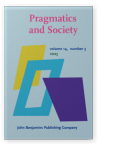Vol. 14:3 (2023) ► pp.410–433
Getting involved or acting in defence
How a corporation uses the ritual act of apology in response to public criticism
This study explores the business ritual practice of apology in corporate crisis management. By comparing the frequencies and analysing apology strategies from fifty local and nonlocal Chinese companies’ public letters of apology, we extend the politeness study of public apology to a broader hierarchy of a ritual frame and discuss the related formulaic patterns and strategies of apology. The results show that both groups share a high proportion of taking responsibility and explaining but differ significantly in their use of such strategies. We find that the business ritual practice of apology varies in accordance with the cultural identity of the corporation. Local Chinese companies tend to greatly rely on a ritual frame of involvement, whereas nonlocal companies take an interest in constructing a ritual frame of defence. The paper provides implications for the scholars of cross-cultural pragmatics and for business practitioners and future research directions for a ritual perspective when revisiting the practice of apology.
Article outline
- 1.Introduction
- 2.Theoretical rationale
- 2.1Corporate apology
- 2.2Cultural identity and corporate apology
- 2.3A ritual perspective of apology
- 3.Methodology
- 3.1Data collection
- 3.2Data analysis
- 4.Findings and discussion
- 4.1Strategies and formulaic patterns of corporate apology
- 4.1.1Expression of apology
- 4.1.2Taking responsibility
- Explicit expression of self-responsibility
- Acknowledgement of self-deficiency
- 4.1.3Explaining
- Buck-passing
- Reference to corporate values
- 4.1.4Showing empathy
- 4.1.5Others
- 4.2Ritual frame of involvement vs. ritual frame of defence
- 4.2.1Local companies’ ritual frame of involvement
- 4.2.2Nonlocal companies’ ritual frame of defence
- 4.1Strategies and formulaic patterns of corporate apology
- 5.Conclusions
- Acknowledgements
- Symbols used in morphological gloss
-
References
